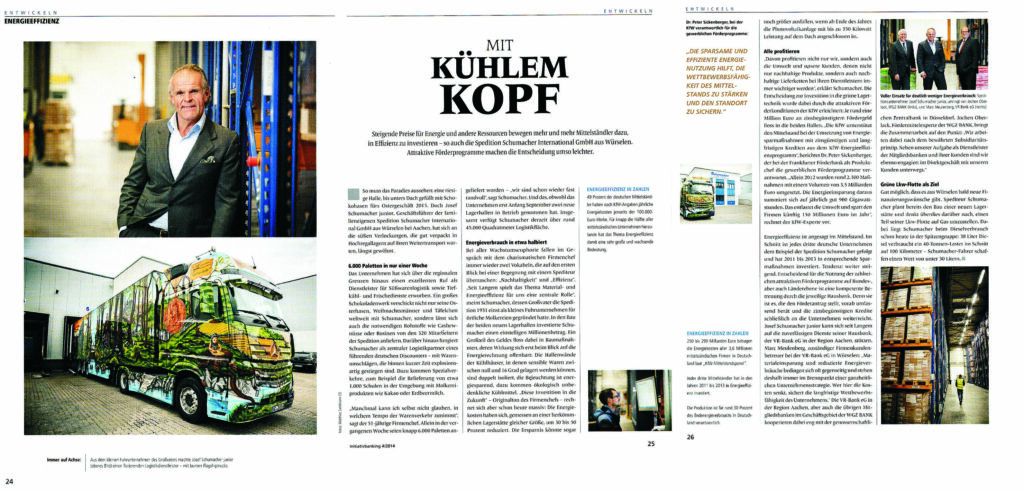WITH A COOL HEAD
*Initiative banking– Development, April 2014
Rising prices for energy and other resources are motivating more and more medium-sized companies to invest in efficiency – including the forwarding company Schumacher International GmbH from Würselen. Attractive funding programs make the decision that much easier.
This is what paradise has to look like: a huge warehouse filled to the top with chocolate bunnies for Easter 2015. But Josef Schumacher Junior, managing director of the family-owned freight forwarder Schumacher International GmbH, from Würselen near Aachen, has long since got used to the sweet temptations that are well packed in high-bay shelves waiting for their onward transport.
6,000 pallets in just one week
The companyhas gained an excellent reputation beyond regional borders as a service provider for confectionery logistics as well as frozen food and fresh products. A large chocolate factory doesn’t just send its Easter bunnies. Santa Clauses and chocolate bars worldwide with Schumacher, but the necessary raw materials such as cashew nuts or raisins can also be delivered by the shipping company’s 320 employees. In addition, Schumacher acts as the central logistics partner of a leading German discounter – with goods turnover that has increased explosively within a short period of time. There are also special transports, for example the delivery of around 1,000 schools in the area with dairy products such as cocoa or strawberry milk.
“Sometimes I can’t believe the speed at which the movement of goods is increasing”. says the 51-year-old boss. In the past week alone, almost 6,000 pallets were delivered – we are almost full to the brim again, “said Schumacher. And that although the company only put two new warehouses into operation at the beginning of September. In total, Schumacher currently has around 45,000 square meters of logistics space.
Energy consumption roughly halved
In the case of a growth euphoria, two words come up again and again in conversation with the charismatic company boss that surprise at first sight when meeting a freight forwarder: “Sustainability” and “Efficiency”.
“The subject of material and energy efficiency has long played a central role for us,” says Schumacher, whose grandfather founded the forwarding company in 1931 as a small haulage company for local dairies. Schumacher invested a single-digit million amount in the construction of the two new warehouses. A large part of the money went into building measures, the effect of which only becomes apparent when you look at the energy bill: the walls of the cold stores, in which sensitive goods between zero and 46 degrees can be stored, are double-insulated, the lighting is energy-saving and ecological harmless coolant. “This investment in the future” – the original sound of the company boss – is already paying off massively today: compared to a conventional storage facility of the same size, energy costs have been reduced by 30 to 50 percent. The savings could be even greater if the photovoltaic system with an output of up to 350 kilowatts is connected to the roof from the end of the year.
Everyone benefits
Not only do we benefit from this, but also the environment and our customers, for whom not only sustainable products, but also sustainable supply chains for their service providers are becoming increasingly important, “explains Schumacher. The decision to invest in green storage technology was made easier by the attractive promotional conditions of KfW: around one million euros in low-interest promotional money flowed into each of the two halls. KfW supports small and medium-sized enterprises in the implementation of energy-saving measures with low-interest, long-term loans from the KfW energy efficiency program, “reports Dr. Peter Sickenberger, who is the product manager at the Frankfurter Förderbank and is responsible for commercial subsidy programs. In 2012 alone, around 2,300 measures with a volume of 3.5 billion euros were implemented. The resulting energy savings add up to a good 900 gigawatt hours per year. That relieves the burden on the environment and will save companies 150 million euros a year in the future, “calculates the KfW expert.
Energy efficiency is popular in medium-sized businesses. On average, every third German company followed the example of the Schumacher freight forwarder and invested in corresponding cost-cutting measures from 2011 to 2013. Trend: increasing. Competent support from the respective house bank is decisive for the use of the numerous attractive funding programs at both federal and state level. Because it is the house bank that submits the funding application, provides comprehensive advice in advance and then passes the low-interest loans on to the companies. Josef Schumacher Junior has long been able to rely on the reliable services of his house bank, VR-Bank eG in the Aachen region. Marc Meulenberg, responsible corporate customer advisor at VR-Bank eG in Würselen: “Material savings and reduced energy consumption are often mutually dependent and are therefore always the focus of a holistic corporate strategy. Anyone who lowers costs here ensures the long-term competitiveness of the company.” VR-Bank eG in the Aachen region, but also the other member banks in the WGZ BANK business area, cooperate closely with the cooperative central bank in Düsseldorf. Jochen Oberlack, funding expert at WGZ BANK, sums up the cooperation: “We work according to the tried and tested principle of subsidiarity. In addition to our job as a service provider for the member banks and their customers, we are also committed to direct business with our customers.”
Green truck fleet as a destination
It is quite possible that Würselen will soon have new financing requests. Freight forwarder Schumacher is already planning the construction of a new storage facility and is also considering converting part of his truck fleet to gas. Schumacher is already in the top group when it comes to diesel consumption: A 40-ton truck consumes 38 liters of diesel on average for 100 kilometers – Schumacher drivers achieve a value of less than 30 liters.






